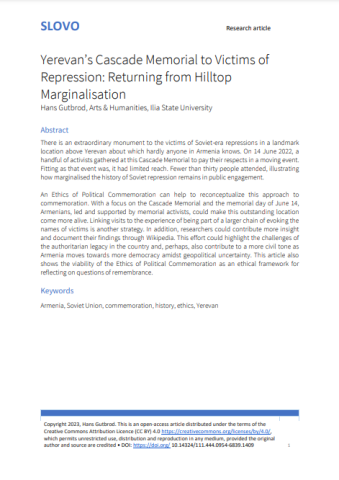This research paper has originally been published on SLOVO website. Available here!
There is an extraordinary monument to the victims of Soviet-era repressions in a landmark location above Yerevan about which hardly anyone in Armenia knows. On 14 June 2022, a handful of activists gathered at this Cascade Memorial to pay their respects in a moving event. Fitting as that event was, it had limited reach. Fewer than thirty people attended, illustrating how marginalised the history of Soviet repression remains in public engagement.
An Ethics of Political Commemoration can help to reconceptualize this approach to commemoration. With a focus on the Cascade Memorial and the memorial day of June 14, Armenians, led and supported by memorial activists, could make this outstanding location come more alive. Linking visits to the experience of being part of a larger chain of evoking the names of victims is another strategy. In addition, researchers could contribute more insight and document their findings through Wikipedia. This effort could highlight the challenges of the authoritarian legacy in the country and, perhaps, also contribute to a more civil tone as Armenia moves towards more democracy amidst geopolitical uncertainty. This article also shows the viability of the Ethics of Political Commemoration as an ethical framework for reflecting on questions of remembrance.

